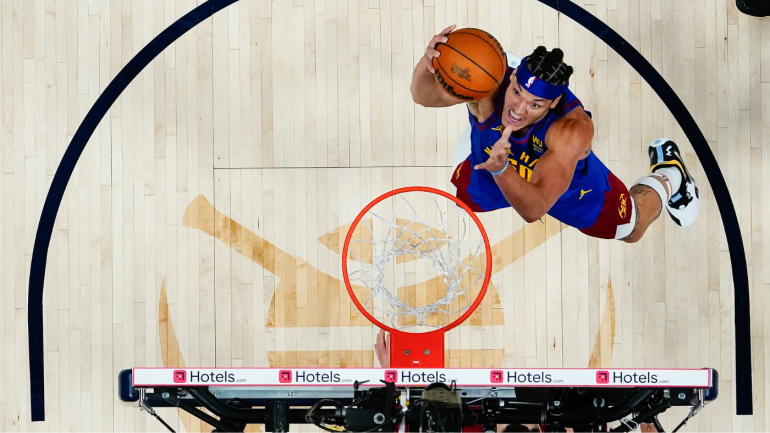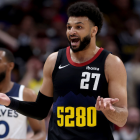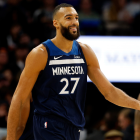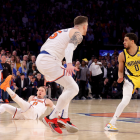
Aaron Gordon is among the the lowest-maintenance players in the NBA. The Denver Nuggets almost never run plays for him, and that can lead to some very misleading box scores. The Los Angeles Lakers, for instance, hardly guarded Gordon during the Western Conference Finals, using Anthony Davis as a help-defender off of Gordon for the sake of extra rim-protection.
He scored just 29 points in the first three games of that series, and while he bounced back in Game 4, there was a case to be made for the Heat to adopt a similar strategy in the NBA Finals using Kevin Love on Nikola Jokic and top defender Bam Adebayo as a rover off of Gordon. Denver's offense is so loaded that opposing defenses typically use Gordon—the only poor shooter in an otherwise dominant offensive starting five—as a place to either hide weaknesses or augment strengths by sagging off of him.
Yet early in Game 1, Denver seemingly ran its entire offense through Gordon. He finished the first quarter with 12 of the easiest points of his career, and those points typically boiled down to one advantage: size.
Miami ultimately elected to maintain the small starting lineup it used against the Boston Celtics in the Eastern Conference Finals. That meant that Adebayo had to defend Jokic and that three Heat starters—Caleb Martin, Max Strus and Gabe Vincent—would be under 6-5. That put Gordon, 6-8 and among the strongest forwards in basketball, in the rare position of being able to hunt mismatches as perhaps the worst scorer in his own lineup.
The easiest way to get those mismatches is in transition. When Gordon wound up on a smaller member of the Heat defensively, Miami had little choice but to start possessions with that player cross-matched onto Gordon offensively. Denver was intentional about getting him the ball as quickly as possible. When Jamal Murray sees Strus on Gordon in the post, he passes him the ball as soon as he crosses half-court. Strus has no chance, and Gordon finishes the layup.
This play takes a bit longer to develop, but the same principle applies. Gordon finds himself on Martin defensively, so when the Nuggets bring the ball up the court, he has Martin on him offensively. He's alone on the weakside block, giving Martin no chance to switch off of him, so when he gets the ball, he once again punishes the smaller defender for two more points.
These mismatches weren't only available in transition, though. The Nuggets also sought them out in half-court settings. Jimmy Butler was Gordon's intended matchup for much of Game 1, and that's a strategy the Heat have used plenty in the playoffs. With Butler on the weakest opposing shooter, he is freer to disrupt the primary opposing pick-and-roll as a helper at the nail. But rather than run a pick-and-roll between Murray and Jokic on this possession, Murray instead uses a quick Gordon screen to force a switch. Butler can handle Murray one-on-one. But the 6-2 Vincent has no chance whatsoever, and Gordon dunks violently.
In a vacuum, this isn't a switch that Miami should so freely concede... yet its options are fairly limited by its personnel. Take this play, in which Gordon starts the defensive possession guarding Butler. Strus misses a 3-pointer, and notice how Butler visibly points to Vincent to call out the pre-switch. His logic is sound. He wants to find Murray, the greater threat. Yet when the ball does eventually make its way down the court, that yet again gives Gordon a one-on-one matchup in the post with a defender half a foot shorter than him.
This is one of the problems that Miami is dealing with as a major Finals underdog, and it's exemplified on Gordon's last bucket of the first quarter. The possession starts with him taking the ball up the floor with three defenders in the area. All three of them—Butler, Strus and Martin—stay connected to Murray and Michael Porter Jr., so Gordon sees the middle of the floor clear and starts a drive. Strus is so far out of position that Gordon takes him out of the play entirely with a eurostep, and Adebayo can offer only meager help because he doesn't want to lose track of Jokic.
The Nuggets force just about every opponent into these sorts of difficult decisions, but size is one of the best answers to Denver's offense. The Lakers were so big that helping off of Gordon or conceding mismatches wasn't a major concern. There was always someone available to help at the rim. Miami is tiny right now, and that is a roster constraint the Heat can't solve in the middle of the Finals.
That's going to give Gordon opportunities like this throughout the Finals. He's a low-maintenance player, but that hardly makes him an unskilled one. Even if he's the least explosive individual scorer in Denver's starting five, he's still athletic enough, skilled enough and smart enough to punish defenses that don't prioritize him. He did so in Game 1, and it gave the Nuggets a lead that they never surrendered.






















